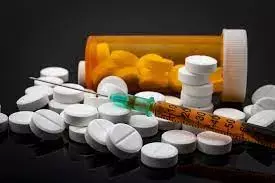- Home
- Medical news & Guidelines
- Anesthesiology
- Cardiology and CTVS
- Critical Care
- Dentistry
- Dermatology
- Diabetes and Endocrinology
- ENT
- Gastroenterology
- Medicine
- Nephrology
- Neurology
- Obstretics-Gynaecology
- Oncology
- Ophthalmology
- Orthopaedics
- Pediatrics-Neonatology
- Psychiatry
- Pulmonology
- Radiology
- Surgery
- Urology
- Laboratory Medicine
- Diet
- Nursing
- Paramedical
- Physiotherapy
- Health news
- Fact Check
- Bone Health Fact Check
- Brain Health Fact Check
- Cancer Related Fact Check
- Child Care Fact Check
- Dental and oral health fact check
- Diabetes and metabolic health fact check
- Diet and Nutrition Fact Check
- Eye and ENT Care Fact Check
- Fitness fact check
- Gut health fact check
- Heart health fact check
- Kidney health fact check
- Medical education fact check
- Men's health fact check
- Respiratory fact check
- Skin and hair care fact check
- Vaccine and Immunization fact check
- Women's health fact check
- AYUSH
- State News
- Andaman and Nicobar Islands
- Andhra Pradesh
- Arunachal Pradesh
- Assam
- Bihar
- Chandigarh
- Chattisgarh
- Dadra and Nagar Haveli
- Daman and Diu
- Delhi
- Goa
- Gujarat
- Haryana
- Himachal Pradesh
- Jammu & Kashmir
- Jharkhand
- Karnataka
- Kerala
- Ladakh
- Lakshadweep
- Madhya Pradesh
- Maharashtra
- Manipur
- Meghalaya
- Mizoram
- Nagaland
- Odisha
- Puducherry
- Punjab
- Rajasthan
- Sikkim
- Tamil Nadu
- Telangana
- Tripura
- Uttar Pradesh
- Uttrakhand
- West Bengal
- Medical Education
- Industry
Opioid use disorder may increase complications and Length of stay after major abdominal surgery

Opioid use disorder (OUD) is tied with more complications and increased Length of stay after major abdominal surgery, according to a recent study published in the annals of surgery.
The objective of this study was to determine the impact of opioid use disorder (OUD) on perioperative outcomes after major upper abdominal surgeries. Opioid use disorder (OUD), defined as dependence/abuse, is a national health epidemic. Its impact on outcomes after major abdominal surgery has not been well characterized.
Patients who underwent elective esophagectomy, total/partial gastrectomy, major hepatectomy, and pancreatectomy were identified using the National Inpatient Sample (2003–2015). Propensity score matching by baseline characteristics was performed for patients with and without opioid use disorder (OUD). Outcomes measured were in-hospital complications, mortality, length of stay (LOS), and discharge disposition.
The results of this study are as follows:
Of 376,467 patients, 1096 (0.3%) had opioid use disorder (OUD). Patients with opioid use disorder (OUD) were younger (mean 53 vs 61 years, P < 0.001) and more often male (55.1% vs 53.2%, P < 0.001), black (15.0% vs 7.6%, P < 0.001), Medicaid beneficiaries (22.0% vs 6.4%, P < 0.001), and in the lowest income quartile (32.6% vs 21.3%, P < 0.001). They also had a higher rate of alcohol (17.2% vs 2.8%, P < 0.001) and nonopioid drug (2.2% vs 0.2%, P = 0.023) dependence/abuse. After matching (N = 1077 OUD, N = 2164 no OUD), OUD was associated with a higher complication rate (52.9% vs 37.3%, P < 0.001), including increased pain [odds ratio (OR) 3.5, P < 0.001], delirium (OR 3.0, P = 0.004), and pulmonary complications (OR 2.0, P = 0.006). Additionally, opioid use disorder (OUD) was associated with increased LOS (mean 12.4 vs 10.6 days, P = 0.015) and nonroutine discharge (OR 1.6, P < 0.001). In-hospital mortality did not differ (OR 2.4, P = 0.10).
Thus, the researchers concluded that patients with opioid use disorder (OUD) more frequently experienced complications and increased LOS. Close postoperative monitoring may mitigate adverse outcomes.
Reference:
Opioid Use Disorder is Associated with Complications and Increased Length of Stay After Major Abdominal Surgery by Song, Yun et al. published in the annals of surgery.
Dr. Shravani Dali has completed her BDS from Pravara institute of medical sciences, loni. Following which she extensively worked in the healthcare sector for 2+ years. She has been actively involved in writing blogs in field of health and wellness. Currently she is pursuing her Masters of public health-health administration from Tata institute of social sciences. She can be contacted at editorial@medicaldialogues.in.
Dr Kamal Kant Kohli-MBBS, DTCD- a chest specialist with more than 30 years of practice and a flair for writing clinical articles, Dr Kamal Kant Kohli joined Medical Dialogues as a Chief Editor of Medical News. Besides writing articles, as an editor, he proofreads and verifies all the medical content published on Medical Dialogues including those coming from journals, studies,medical conferences,guidelines etc. Email: drkohli@medicaldialogues.in. Contact no. 011-43720751


